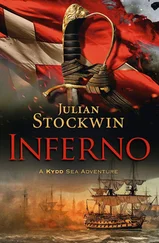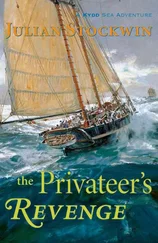Julian Stockwin - 19 The Baltic Prize (Thomas Kydd #19)
Здесь есть возможность читать онлайн «Julian Stockwin - 19 The Baltic Prize (Thomas Kydd #19)» весь текст электронной книги совершенно бесплатно (целиком полную версию без сокращений). В некоторых случаях можно слушать аудио, скачать через торрент в формате fb2 и присутствует краткое содержание. Год выпуска: 2017, Издательство: Hodder & Stoughton, Жанр: Старинная литература, на английском языке. Описание произведения, (предисловие) а так же отзывы посетителей доступны на портале библиотеки ЛибКат.
- Название:19 The Baltic Prize (Thomas Kydd #19)
- Автор:
- Издательство:Hodder & Stoughton
- Жанр:
- Год:2017
- ISBN:нет данных
- Рейтинг книги:3 / 5. Голосов: 1
-
Избранное:Добавить в избранное
- Отзывы:
-
Ваша оценка:
- 60
- 1
- 2
- 3
- 4
- 5
19 The Baltic Prize (Thomas Kydd #19): краткое содержание, описание и аннотация
Предлагаем к чтению аннотацию, описание, краткое содержание или предисловие (зависит от того, что написал сам автор книги «19 The Baltic Prize (Thomas Kydd #19)»). Если вы не нашли необходимую информацию о книге — напишите в комментариях, мы постараемся отыскать её.
19 The Baltic Prize (Thomas Kydd #19) — читать онлайн бесплатно полную книгу (весь текст) целиком
Ниже представлен текст книги, разбитый по страницам. Система сохранения места последней прочитанной страницы, позволяет с удобством читать онлайн бесплатно книгу «19 The Baltic Prize (Thomas Kydd #19)», без необходимости каждый раз заново искать на чём Вы остановились. Поставьте закладку, и сможете в любой момент перейти на страницу, на которой закончили чтение.
Интервал:
Закладка:
‘As our forces were divided on their various occasions, I knew too well that all it required was for a determined sortie from Kronstadt to fall upon us in our weakened state, and our bold and noble cause would be finished. Then I received news that finally such had occurred – and with an armament greater than any that has faced our country since Trafalgar.
‘In the towns and villages of the kingdom they will not hear of a mighty clash at arms, a desperate confrontation, but you and I know full well what we have achieved together. The Imperial Russian Navy is now locked up within Rågervik and I hold the key. It shall remain there impotent until the ice comes to seize it. Next year when the ice retreats they will find me here waiting, and I will not be moved.
‘And I will tell you what it means. In fine – we have won! We have prevailed over the Tsar, over Bonaparte, the elements themselves. In a friendless sea we have established and secured the greatest victory of all.’
Then, beaming triumphantly, he proposed the toast, ‘Do raise your glass with me and drink to our prize.
‘Gentlemen: the Baltic!’
Author’s Note

Rågervik is the second battle of Trafalgar that never was. Long anticipated, it was set fair to be the greatest clash of fleets Britain’s navy would face since Nelson’s day. That it didn’t happen has never been fully explained – why should the might of the Kronstadt imperial battle-fleet flee at the sight of just two ships-of-the-line? Even more so, why did it then skulk in harbour never to exit for the rest of the war? The only conceivable explanation is the extraordinary moral superiority of the Royal Navy at this stage of the war that held its foes in such dread.
At the time Saumarez was blamed for not bringing about a full-scale fleet action but he arrived on the scene just one day later, narrowly missing Khanykov’s fleet at sea. The reason for his delay is one of the most remarkable and little known tales of the war.
In the army of Napoleon there were troops from many countries and most of those massing in Denmark for the invasion of Sweden just across the water were those of his ally, Spain. Exploiting unrest caused by rumours of Bonaparte’s move to place his brother Joseph on the throne, the shadowy figure of James Robertson, a Scottish Catholic priest, was infiltrated into Denmark to subvert the Spanish field commander, the Marquis de la Romana. He did so, and in a feat of daring and secrecy, the Royal Navy landed parties of seamen in the southern Danish islands and extracted nearly ten thousand front-line troops from under the very noses of the French, thereby making the invasion of Sweden impossible.
Saumarez was torn between sailing to meet the Russians or supporting this absurd-sounding clandestine mission; his decision to do the latter almost certainly cost him a great victory, fame and a peerage, but he knew the greater issue was the Baltic trade and a wounded Tsar would have turned against him.
This victory, however, secured the Baltic for Britain and it marked the beginning of the end for Bonaparte, for it was Tsar Alexander’s refusal to enforce Napoleon’s Continental System that infuriated the emperor enough to embark on the fatal 1812 invasion of Russia. On Khanykov’s return, this Russian admiral faced court-martial in Moscow for cowardice, and in an autocratic and brutal regime was unaccountably able to get away with a sentence of demotion to ordinary seaman for one day. In a tangible reminder of the occasion, the entire stern gallery section of HMS Implacable is on display at the National Maritime Museum, Greenwich.
After his escape Sir John Moore, that prickly, stiff-necked military figure, took all his men back to England; he met fame and a hero’s death at Corunna later in the year.
The last Danish big-ship fight is still remembered more for the loss of the plucky Willemoes in Prinds Christian Frederik , the young man who had stood defiant on a gun raft against Nelson in Copenhagen. Walking through the remote and sandy hamlet of Havnebyen on Sjællands Odde, you will come across the roads Willemoesvej and Jessensvej, and in the wardroom of the naval artillery school at the tip of the peninsula, with its long-fanged reef, there are further memories.
Johan Krieger, the fiery gunboat leader, has his small share of immortality: a charming portrait in the naval museum in Copenhagen reveals him as a chubby, mischievous soul, who would no doubt have been a fine and jolly messmate at Nyholm, but it is probably fair to say he caused the British more grief than any other Dane during the ‘English Wars’.
The attack on Kildin by Nyaden frigate, on which I based Kydd’s storming ashore, was mentioned in The Times as the first ever British incursion on Russian soil and, with other isolated Arctic incidents, would be the last until the failed 1919 intervention against the Bolsheviks. It is a crushingly desolate place and charts of the island are difficult to find: today it is the unhappy graveyard of discarded nuclear submarine engines of the Soviet fleet, but its isolation is a boon for various exotic Arctic fauna.
The Sveaborg fortress still exists and is a popular and interesting attraction in Helsinki under the Finnish name of Suomenlinna, its sudden capitulation fuelling endless speculation and conspiracy theories among Swedish writers. Cronstedt was a genuine hero, leading Sweden to the crushing defeat of Russia at the sea battle of Svenskund some years before. However, after being embayed in Malmö and unable to come to the aid of the Danes fighting Nelson he was publicly humiliated by the Swedish king, Gustav IV Adolf, and rusticated to Sveaborg. His supporters state that there is no evidence from the years after the surrender of a change in lifestyle, indicating bribery or a sell-out, but this in fact would be consistent with the case that he in turn had been cheated by the Russians in the matter of gold buried on the parley island …
The capture of Anholt, upon which I’ve closely based my Börnholt, has its measure of curiosity also. The island was promptly commissioned into the navy as HMS Anholt after the success of HMS Diamond Rock off Martinique several years before and the Admiralty felt impelled to send for the very same man to take charge, Commander James Maurice, who in that post later victoriously defended it against the vengeful Danes.
For the Swedes this has to be accounted their saddest hour, especially their proud navy, which at this point was riven by factions and defeatism. The Finnish war did not go well for them, at one time an audacious winter crossing by the Russian Army of the ice to the Åland islands threatening Stockholm itself. It couldn’t last and the last Vasa, Gustav IV Adolf, was deposed in a scene out of Shakespeare.
In Gripsholm Castle I visited the very room and saw the desk where his abdication was effected. The former monarch was fated to wander Europe, a king without a throne. The weak and faltering king who succeeded him lasted long enough to declare war on England and, finally, the last ally of Britain on the Continent fell. Yet in large part due to the truly exceptional talents of Saumarez the war was conducted without a shot fired, the enemy victualling and supplying their very opponents, with Matvig and other secret bases conveniently overlooked. Above all, the Baltic trade continued without a tremor, even with the British now completely surrounded by hostile nations. Then, because of the state of war against England, the Swedes were obliged to source a new king from closer by, namely Prince Bernadotte, who, once on the throne, felt able to defy Bonaparte and even take up arms against his own countrymen, defeating them roundly.
Читать дальшеИнтервал:
Закладка:
Похожие книги на «19 The Baltic Prize (Thomas Kydd #19)»
Представляем Вашему вниманию похожие книги на «19 The Baltic Prize (Thomas Kydd #19)» списком для выбора. Мы отобрали схожую по названию и смыслу литературу в надежде предоставить читателям больше вариантов отыскать новые, интересные, ещё непрочитанные произведения.
Обсуждение, отзывы о книге «19 The Baltic Prize (Thomas Kydd #19)» и просто собственные мнения читателей. Оставьте ваши комментарии, напишите, что Вы думаете о произведении, его смысле или главных героях. Укажите что конкретно понравилось, а что нет, и почему Вы так считаете.










